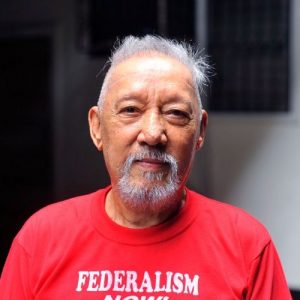“Some studies suggest that when selecting a new host, the clown fish has to go through a process of adaptation. It has been observed that when the fish approaches an anemone for the first time, it touches the anemone intermittently for a few hours. Apparently, this on-and-off contact allows the clown fish to modify its protective coating to conform to the anemone’s particular poison. Possibly the clown fish gets stung a little during this process. But after that, the two get along fine.” (Awake Pamphlet No. 6, 2016).
-oOo-
In the same vein, Constitution making should undergo first a process of consultations and listening before actual work by a Committee or Commission tasked to draft the Charter starts. This way, the ideals and aspirations of our people will be the main basis in the formulation of a truly People’s Constitution.
Citizen’s participation in this serious undertaking is very crucial for the people to really own their Fundamental Law.
Very unfortunately, the members of the Consultative Committee (Con-Com) created by Malacañang to draft our new Federal Constitution didn’t live up to its name. They miserably failed to do properly their assigned task which created the present chaos we are in now. After three years of the Duterte administration, our drive to adopt a new Federal Constitution retrogressed instead of moving forward courtesy of Con-Com.
My immediate reaction to the Con-Com’s draft Federal-Presidential Constitution was that it is a “Recipe for Disaster”. This was followed up by Malacañang Financial Managers which strongly criticized Con-Com’s output saying: “This will run havoc to our economy.” Many other sectors in our society disagreed with Con-Com draft Charter particularly its proposed 18 Federated Regions as “being weak and very disruptive”. Our Congress threw the Con-Com’s draft Constitution to their “waste basket”.
We learned that Con-Com members are now making “consultations” with some government officials without representatives from Malacañang Financial team and private sectors especially more experienced Federalist groups. “Mukhang lutong makao rin ito”. The feedback we got was that the Con-Com members are still so defensive of their many questionable provisions. This is an exercise in futility.
Why are Con-Com members acting this way? Your guess is as good as mine. It seems that they don’t trust the wisdom of our people or they have their own agenda. This is reflected on the answer of Con-Com’s spokesman when he said in a radio interview in Davao City that there’s really no need to consult our people on this highly legal Matter! This fellow maybe out of his mind.
Ironically, Con-com named their “output “Bayanihan” Constitution What?! This is a sacrilege to Filipinos spirit of “Bayanihan” which means working together (government and citizen to achieve a certain thing. In this case, Con-Com did their think alone without people’s participation at the very start. Thus, their use of “Bayanihan” is seemingly a form of grand deception! “Di ba?”
Our national hero Dr. Jose Rizal was the first Filipino to advocate for the establishment of a “Federal Republic of the Philippines.” Former Chief Justice Reynato S. Puno is the head of the nationwide “Knights of Rizal”. It follows therefore that CJ Puno is a pro-Federalism. In one of his speeches, he rightly pointed out that a Federal System will transform our “failing democracy” to “full democracy”. I also learned that CJ Puno is more inclined to Cooperative type of Federalism before he was even appointed as Chairman of the Con-Com. I surmise that CJ Puno’s pre-conceived idea of Cooperative Federalism greatly influenced the Con-Com members in their task. Thus, their draft charter was based on the ideals and aspirations of Con-Com members only.
Cooperative Federalism was adopted by counties of Germany, Ethiopia, South Africa, and Venezuela. It has the following characteristics 1) Shared functions, focus on providing services, broadly collaborative patterns, 2) National Government and Federal State Governments cooperative in solving problems. 3) Powers of Federal States consistently diminish. And 4) Intertwined policy-making and administrative functions of Federal States and National Government.
One big problem confronting Cooperative Federalism is that many major governmental powers are shared by the National Federal Government and Regional Federal Governments. Based on the experiences of countries with this type of Federalism is that many Constitutional cases arose from such set-up which could paralyze or tremendously delay government services at the sacrifice of their people.
The name of their detrimental game here is constant “push and pull” between these two levels of governments.
Due to utter lack of consultations by the Con-Com, their ideals and aspirations for a Cooperative type of Federalism run counter with the ideals and aspirations of pro-federalism groups, especially from Mindanao, which is for a Competitive type of Federalism such as in Australia, Belgium, Brazil, Canada and USA. Its characteristics are 1) National Government has worked to reduce its role in Federal State and Local Governments 2) The Federal State and Local Governments have regulatory functions and 3) “Carrot and stick” approach is being used.
Let’s make this very clear so that our people will not be misled. While the Con-com’s draft Constitution which failed to create nationwide constituency was administratively forwarded by Malacañang to Congress, this does not mean that this is already President Duterte’s official final version as some people with hidden agenda are saying. It was endorsed by Malacañang to Congress for appropriate action as a sort of working draft, not for adoption. All Federalism models being proposed in the country should be treated as, merely proposals, nothing less, nothing more.” “Klaro ba ito”? The final draft has yet to be approved by President Duterte for nationwide Plebiscite before President Duterte’s term expires.

